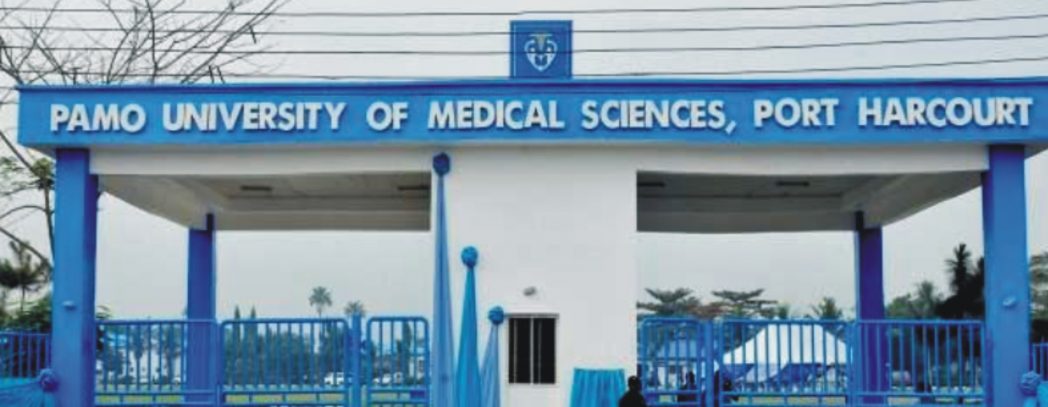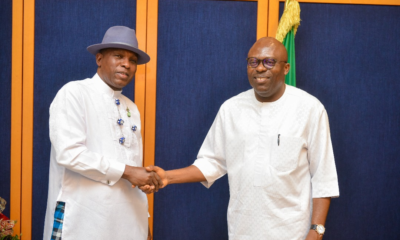Editorial
Oil Spill Sites: Challenges Ahead
The Federal Government penultimate week, announced plans to clean up more than 2,405 oil spill sites in the Niger Delta with the assurance that the impacted sites will undergo proper remediation and sustainable restoration as part of the implementation of the amnesty programme.
The project, Government explained, will cover 252 pollution sites reported in 2006, 598 cases in 2007, 927 in 2008, and 628 recorded in 2009.
As a first step towards fast tracking the process, the government recently set up a 16-member sub-committee made up of officials of the National Oil Spill Detection and Response Agency (NOSDRA), representatives of oil companies operating in the region, non-governmental organizations, host communities, representatives of impacted local governments and security agencies.
Inaugurating the sub-committee in Abuja, Permanent Secretary, Federal Ministry of Environment, Dr Biodun Nathaniel Olorunfemi, expressed worry that a significant proportion of the spills were attributable to vandalisation and other illegal oil bunkering activities. According to him, “there were numerous cases of illegal bunkering activities and the operations of illicit local refineries, both of which impacted negatively on the fragile ecosystem of the Niger Delta region”.
Worrisome, costly and alarming as they are, we are under no illusion that all the spills were accidental. Some are, many others indeed man-made. That is why, The Tide joins government and other well-meaning Nigerians to unite in condemnation of the near frequent cases of sabotage of crude and sometimes, refined petroleum products facilities, in the region. We say so because the nefarious activities of these criminals have without doubt unleashed untold hardship, destruction and pollution on the Niger Delta environment and entire ecosystems, resulting in monumental drawbacks in not just the revenue profile of the communities, states and Federal Government, but also mortgaging the future of the people.
But beyond all that, the long neglect and abandonment of these impacted sites has subjected the affected region to incalculable damages.
Although the delay in granting approval for the clean up of the sites, more than five years after, depicts total indifference on the part of the Federal Government, to the health, environment and safety needs of the people of the region, we feel the need to commend the latest discretion, no matter how belated.
It is, therefore, necessary for the government to make sure that the negative impact of oil and gas exploration and production does not drag on any longer. The sub-committee should move swiftly into action, and ensure that a good job is done. It must also ensure that the steps towards remediation and restoration of the sites meet international best practices, even as we advise against similar long delays on issues of this nature, in future.
Even so, The Tide insists that in addition to the planned clean up, Government, must ensure that impacted communities are adequately compensated for the wanton destruction and pollution of their, flora and fauna. We consider it most instructive to make this case because we know that some agencies of government and oil companies would trump up the issue of sabotage as grounds to evade compensation payment to impacted communities.
Further more, we also recommend that critical issues of infrastructural and human capacity development in the region should be addressed decisively if the post amnesty package is to make any meaning.
Now perhaps, is yet another opportunity to advocate, even for the umpteenth time, the speedy implementation of the recommendations of the report of the Niger Delta Technical Committee. We say this because we know that the clean up of the region is only a fraction of the numerous demands of the people.
The time to start positive action and give the Niger Delta people a renewed sense of belonging, is now.
Editorial
Towards Minimum Wage Implementation

It is not surprising that organised labour is pushing for a wage review, as President Bola Tinubu’s economic reform has negatively impacted Nigerian workers. Since taking office last May, the economy has been in turmoil, leading to hardships for many employees. The need for a wage increase is vital as workers continue to bear the brunt of the economic downturn.
The implementation of minimum wages in Nigeria has historically faced several obstacles. Despite the government’s mandate to set and enforce a minimum wage for all workers, many employers, particularly state governors and in the informal sector, fail to comply. This widespread non-compliance undermines the objective of protecting workers from exploitation and ensuring a basic standard of living.
Numerous factors contribute to the challenge of implementing minimum wages in Nigeria. One major issue is the lack of effective enforcement mechanisms. The National Salaries, Incomes and Wages Commission (NSIWC) is responsible for enforcing the minimum wage, but its powers are often limited. Employers who violate the law often go unpunished due to weak enforcement and the high cost of legal proceedings for workers.
In the negotiations between the federal and state governments, a critical factor that must be considered is finding the right balance amidst the challenges posed by the country’s double-digit inflation rate, the growing national debt profile, and the pressing issue of ensuring timely payments from both state and federal authorities. Both levels of government must collaborate to address these economic concerns and come to a mutually beneficial agreement that prioritises the financial stability of the nation.
Things are not looking good. The organised labour, represented by the Nigeria Labour Congress and the Trade Union Congress, has proposed an astronomical jump from the current N30,000 per month to N650,000. While it is undeniable that the current rate of N30,000 is insufficient, the drastic increase to N650,000 is simply not realistic and may not be feasible for the government to implement. Both parties should find a middle ground that is fair and sustainable for all stakeholders involved.
The challenge before the minimum wage committee, which Tinubu inaugurated recently, is to find a realistic rate for all the parties concerned, including the private sector. This task is not an easy one, as there are various factors to consider when determining a fair minimum wage that benefits both workers and employers. The committee will need to take into account the cost of living, the current economic situation, as well as the financial capabilities of businesses, especially small and medium-sized enterprises.
Incidentally, the Nigerian economy is facing multiple challenges at the moment. With inflation at a staggering 29.90 per cent, a debt stock of N87.9 trillion, a high lending rate of 18.75 per cent, and a grossly devalued naira at N1,300 per $1, the cost-of-living crisis has worsened. The recent surge in food inflation, jumping to 35.41 per cent in January from 23.75 per cent the previous month has added to the economic woes. Moreover, the rapid price increases in petrol and diesel, essential for the economy, have further burdened the already distressed population.
Hence, the demand by labour for an upward wage review is justified given the rising cost of living and inflation. However, the government faces a dilemma in determining the appropriate rate of increment. Nigeria’s economic situation is dire, with debt servicing consuming a staggering 99 per cent of its revenue in the first quarter of 2023. Balancing the need to improve workers’ welfare with the constraints of the economy is a delicate task. The government must engage in constructive dialogue with labour to find a compromise that addresses their legitimate demands while ensuring the long-term sustainability of the economy.
If the government succumbs to labour’s demands and borrows more to fund the wage increase, its financial stability will be further compromised. This could lead to a debt crisis, with severe consequences for the economy. The governing authorities must explore alternative revenue sources and implement prudent fiscal measures to address labour’s concerns without jeopardising the nation’s financial health.
Retrospectively, an excessively high minimum wage can pose challenges for states. When the wage was raised to N18,000 during the Goodluck Jonathan era, many states struggled to meet their salary obligations. As of October 2023, BudgIT reported that 15 states were still failing to pay the N30,000 minimum wage set by the Muhammadu Buhari administration in 2019. This situation has dire consequences for workers, who rely on their wages for sustenance.
The inability of states to pay the minimum wage is often attributed to their limited economic viability. Data from Economic Confidential indicates that only seven states are economically viable without federal allocations. This means that the majority of states rely heavily on federal support to meet their financial obligations. When the minimum wage is raised too high, states with weak economies may find it difficult to balance their budgets and fulfil their responsibilities to both workers and other sectors.
Any minimum wage that will be agreed upon should be sufficient to meet the needs of Nigerians. Unfortunately, many state governors have failed to implement the wage award approved by the Federal Government for civil servants, despite the high cost of living. This lack of action is unacceptable and shows a lack of appreciation for the struggles that public sector workers face. State governors should prioritise the well-being of their employees and ensure that they are able to make ends meet with the wages they receive.
We firmly advocate for the autonomy of state governments to streamline their workforce by retaining only those workers who demonstrate productivity. An example of this would be questioning the necessity of hiring typists in the era of advanced technology. Additionally, the rationale behind employing 20 drivers within a government agency deprived of operational vehicles may also be subject to scrutiny.
Many governors overlook the importance of paying their workers properly, which can have a positive impact on the overall productivity and economic growth of their states. States should have thriving industries that can create employment opportunities. Governors need to understand that low consumer demand can hinder the growth of businesses in their domains. They have to consider implementing efficient wage systems to ensure fair compensation for workers and foster economic development.
Editorial
That Odili’s Health Centre Gesture

Ndoni, a small, but peaceful community in Ogba/Egbema/Ndoni Local Government Area of Rivers State
was recently filled with excitement when eminent dignitaries, including Governor Siminalayi Fubara, attended the inauguration of the new Comprehensive Primary Healthcare Centre. This generous donation came from the PAMO Educational Foundation, established by former Rivers State Governor, Dr Peter Odili, who hails from the Ndoni community where he is deeply revered. The Foundation holds a special place in the hearts of the local people.
The inauguration ceremony was a source of great joy and celebration for the community, as the new healthcare facility promises to provide much-needed medical services to the people of Ndoni. The facility is built to provide a wide range of healthcare services, including maternal and child health, immunisation, family planning, and treatment for common illnesses. It is expected to significantly improve the health outcomes of the community, especially for women and children.
PAMO Educational Foundation’s unwavering dedication to enhancing the well-being of the Ndoni community and its environs is exemplified by the establishment of this health facility. The Foundation has consistently invested in initiatives that foster education and healthcare, and this new amenity is a testament to its ongoing commitment. PAMO’s rich history of supporting educational endeavours and healthcare programmes in the community has laid the groundwork for the Foundation’s continued contributions. The health resource stands as a beacon of hope, providing much-needed medical services and improving the quality of life for countless individuals.
Undoubtedly, the presence of dignitaries underscored the necessity of the event and the value placed on the health centre by the community and the state government. The Ndoni people expressed their profound gratitude to PAMO Educational Foundation and former Governor Odili for their generosity and commitment to the well-being of the community. They pledged to make good use of the health appliance and ensure that it served its intended purpose for many years to come.
The former health centre, a vital lifeline for the town and its neighbouring communities, fell victim to the relentless floods of the River Niger in 2020 and 2022. The torrential waters ravaged buildings, destroyed crops, killed livestock, and tragically claimed lives. In the wake of this devastation, residents were left without access to essential medical services, a cruel blow that compelled them to undertake arduous journeys to distant communities like Omoku for over two years. The old primary health amenity was erected during the administration of Odili and inaugurated in 2008.
The unveiling of the new health institution brought a surge of palpable relief and gratitude to the beneficiaries. The modern facility, equipped with state-of-the-art apparatus and dedicated medical professionals, stood as a symbol of hope and resilience. It marked a new chapter in healthcare for the community, providing them with the means to access quality medical services in the comfort of their own surroundings. The trauma of the floods was slowly fading into memory, replaced by a sense of renewed optimism and a profound appreciation for the gift of healthcare.
Governor Fubara inaugurated the event, which provided a platform for reconciliation as numerous politicians who had previously distanced themselves from the current government were seen at the gathering, showing their support for Fubara’s administration. In his address, the governor thanked Dr Odili, the founder of the PAMO Educational Foundation, and a key political figure in the state, for standing by his administration in the wake of the political turmoil in the state.
He pledged his government’s support to the Ndoni people by enhancing the healthcare accommodation and highlighting Odili’s legacy as a valuable gift. The administration aims to provide quality education, healthcare services, and empowerment, including agriculture and human capital development. Fubara has already approved the recruitment of 1,000 medical doctors for primary health, Hospital Management Board, and Rivers State University Teaching Hospital to improve healthcare delivery and ensure the use of zonal hospitals in the state.
Odili praised Fubara for his humility and commitment to protecting Rivers people in line with the constitution, and encouraged him to focus on providing good governance. He said: “Politics is over, it is now time for governance and you have to hit the ground running, you have touched the critical sectors. In less than one year in office, you have touched education, you have touched health, but the key to what you have done so far is the focus on human beings, on the people, especially the poor amongst you. Human beings are the soul of society. So touching the lives of human beings is more important, you have started showing signs of that.”
We express our sincere gratitude to the former governor for his incredible determination in establishing the health facility. This admirable deed will always be remembered in history as a symbol of his unwavering dedication to the health of the people in our state. By generously donating his personal resources, he has shown true patriotism and a deep love for his community. His selfless actions have not only provided essential healthcare services but have also inspired others to do the same.
For the Ndonis, the inauguration of the health facility marks a critical milestone in the provision of accessible and affordable healthcare. It is an attestation to Odili’s visionary leadership and his unwavering belief in the importance of investing in the health and well-being of his people. We celebrate this Rivers son for his exceptional foresight and humanity. His legacy will be forever linked to this exceptional facility, which will continue to serve as a beacon of hope and healing for generations to come.
All the elites in our state should emulate Odili by embracing a spirit of collaboration with the government to foster the development of the state rather than disparage aimlessly. Needless criticisms, on the other hand, can hinder progress and create an atmosphere of distrust. While constructive animadversion is essential for holding leaders accountable, excessive or unfounded negativity can undermine morale and discourage alliance. If we focus on solutions rather than problems, we can create a positive and productive environment that attracts investment, promotes innovation, and ultimately leads to a better future for all.
Peter Odili’s exploit underscores the critical role private sector infrastructural initiative plays in enhancing the economic landscape of a state. He has not only bridged the gap between the government and private entities, but has also set a precedent for cooperation that fosters innovation, attracts investments, and creates job opportunities. These partnerships are vital for unlocking the untapped potential of the state, laying the foundation for sustainable development. The government’s recognition and support of the private sector as a driver of economic progress are essential. Rivers State can progress towards a future characterised by robust economic transformation and an improved quality of life for its people, if it emulates Odili’s example of promoting synergy.
Editorial
For Peace In The M’East
Tensions in the Middle East have been a cause for concern for decades now. The region has been plagued by conflicts, violence, and instability, with countries such as Israel, Iran, Iraq, Yemen, and Syria being at the centre of many disputes. The failure to resolve these concerns may have devastating consequences for the people living in the region. It also has what it takes to escalate into much larger encounters.
If the international community fails to act swiftly to end the hostilities, there is a real risk that a Third World War might ensue. The clashes in the region are perplexing and passionately rooted in historical, religious, and political distinctions. The inability to address these underlying matters and uncover peaceful solutions has only fueled the fire of discord and contentions among the nations involved.
The Middle East is a crucial geopolitical region, with significant reserves of oil and natural resources, as well as being a hotbed of religious and cultural diversity. The fracas in the region has far-reaching socioeconomic aftereffects. Any intensification in the brunt could have widespread upshot for global security, trade, and stability.
No one should take the probability of a Third World War arising from the region lightly. The use of nuclear weapons, the involvement of major world powers, and the potential for an expansive regional conflagration could have catastrophic backlash. The international community must unite to address the root causes of the apprehensions in the region and work towards sustainable solutions.
The ongoing feud between Iran and Israel suggests that there may be challenging days ahead for international peace. It is troubling that what started with Israel’s offensive on Iran’s consular building in Syria on 1st April may not end with Tehran’s Operation True Promise. The bombing in Damascus, which killed at least two top Iranian generals, resulted in the first-ever direct strikes launched against Israel from Iranian territory. The Jewish State’s recent reprisal for the Iranian onslaught may open a new vista in the conflict.
During the intrusion, Iran reportedly launched more than 300 missiles and drones. Almost all were annihilated by Israel’s air defences, augmented by forces from the United States, United Kingdom and Jordan. The Iranians had made their intentions clear, giving Israel and its allies time to prepare themselves, and quickly issued a statement at the United Nations in New York that their retaliation was over.
With the current war in Gaza between Israel and Palestinians, there are fears that the region is on the brink of an all-out war, with conceivably fatal aftermath. This is a defining moment in the Middle East. That is why it is right for world leaders to pressure Israeli Prime Minister, Benjamin Netanyahu, to exhibit restraint. Then both Israel and Hamas could engage in talks to free Israeli hostages and end hostilities.
In addition to the Israel-Palestine strife, the civil wars in Syria and Yemen have further exacerbated the crisis in the region. The fray has resulted in massive deracination of people, extirpation of infrastructure, and loss of lives. The international community must seek a political solution to these inessential wars and provide humanitarian abetment to those affected by the violence.
Moreover, the rise of extremist groups such as ISIS has also destabilised the region, posing a threat to global security. Nations in the locale and beyond should interface and combat terrorism and extremism. A coordinated effort is required to address the very causes of the commination, such as poverty, lack of education, and political marginalisation. Clearly, the status quo in the bailiwick is unsustainable. A new approach is vital to end the dire straits in the region.
Intense diplomatic endeavours, dialogue, and cooperation are cardinal in resolving the impasse in that portion of the world. The use of military force or unilateral actions will only further escalate the situation and increase the risk of a larger conflict. It is time for all parties involved to set aside their disparities, and build a stable future for the Middle East.
Global amity is indispensable for the well-being of all individuals and nations. It is the foundation upon which sustainable development, economic prosperity, and human rights can thrive. The United Nations was established with the primary goal of advancing peace and security among countries, and it is obligatory that the organisation achieves this objective.
Super powers should animate collaboration and diplomacy to attain harmony. These nations have the wherewithal to make necessitous strides in promoting stability and security on a global scale if they set aside political dissimilarities and focus on common goals. Through open communication and mutual respect, super power countries can lead by example and inspire other nations to follow suit in creating a more nonbelligerent world for present and future generations.
Efforts must be made to avert a Third World War. Its idea is deeply disturbing and contentious. It is one that evokes fear, uncertainty, and global disquietude. The possibility of such a cataclysmic event occurring is something that many would rather not think about, yet the signs and anxieties among countries are becoming increasingly apparent. States must be vigilant, proactive, and committed to building a better future for the world.
-

 Nation5 days ago
Nation5 days agoIbom Developers Supports 160 Women with Skill Acquisition Training in Akwa Ibom
-
Niger Delta5 days ago
Fire razes 4 shops in Edo
-
News5 days ago
Reps Order NERC To Suspend Implementation Of New Electricity Tariff
-
Niger Delta5 days ago
Calabar Port Dormant In 25 years -Manager
-
News5 days ago
FG Flags Off PH-Aba Train Service
-

 Featured5 days ago
Featured5 days agoDraw Up Futuristic Policies To Strengthen Governance, Fubara Tells NISS Team …Says Rivers’ll Deploy AI To Drive Dev, Tackle Political Crisis
-
News5 days ago
Drama As Senators Jostle For Seats In Newly Renovated Chamber
-

 Niger Delta5 days ago
Niger Delta5 days agoDiri swears in 14 Commissioners, Revenue Chairman

